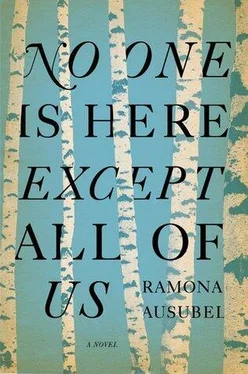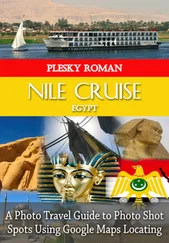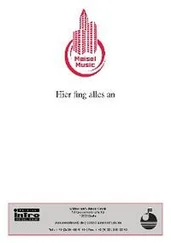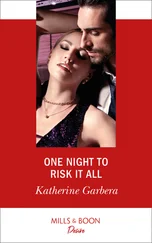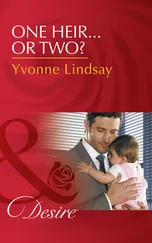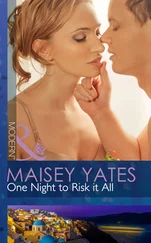Regina went to the widow’s house, where they drank vodka surrounded by the reckless scent of vinegar. While she drank, Regina carefully wrote labels for the mustard jars. The widow had jagged, fearsome handwriting that would have led any potential customers to believe they were about to be poisoned, while Regina’s was a lilting script. Good Mustard with Seeds. Good Mustard without Seeds. The widow believed names should be direct and never tricky.
“It’s hard to believe we ever weren’t friends,” Regina said, eating a deep yellow glob out of a jar with her finger. She offered a taste to the widow, whose mouth was warm and slick. By the grace of God, both women, still in their wedding clothes, fit into the small bed and slept as soundly as they ever had or ever would, their legs and arms finding rest like the tangled roots of two trees.
And for the first time since Regina was born, Perl and Vlad came home alone. The fire was still going and the house was warm. Vlad stoked the coals; Perl picked up a rag but found nothing to dry or clean. No one asked for a song or a prayer. “I don’t know what to do with myself,” Perl said. Vlad opened his arms.
“Just us two and no one else.” He placed, like seeds in the earth, a hundred kisses on his wife’s smooth scalp. Anything could grow there, but my first parents were in no hurry. They liked the offer this empty room made, all the dark quiet filling it like deep, rich, unknowable soil.
The jeweler came to the barn with a box of cakes and a new part in his very combed hair, and he drew the radio out of the hole. The stranger said, “Let’s wait to turn it on until some more of that beautiful music is on.” The jeweler was confused, but he wanted her to be happy. They tucked themselves into the nest of blankets.
“Cake?” he said, opening the box.
“I have to tell you something,” the stranger said. “I remember the other world,” she said, biting into a chocolate square. “I remember all of it.” This secret blossomed in the silence around them. “But I don’t know if I believe in it.”
“What does remembering mean, then?”
“The only true thing is what’s in front of you, right now. We listened to the radio and nothing changed. It’s Once Upon a Time. A fairy tale,” she added.
“Tell me a story from before,” he told her. “As a test.” She let the old, forbidden images rise out of the ground where she had buried them.
“Once upon a time a girl lay on her back in the sunshine with a stomachache from eating too many plums off the tree,” the stranger said. “She was proud of that pain because it had been such a joy to earn it.”
“Once upon a time there was a boy whose father would stalk off to his jewelry desk whenever he was mad at the boy,” the jeweler said. “He would always put the loupe over his eye. When he looked up at the boy, he had one small eye and one giant, magnified one and the boy thought he could see his insides with it. He thought his father was watching his mad little heart beat.”
The stranger looked at the jeweler and smiled. “You had a father?”
The jeweler reached both hands around to the back of his neck and unclipped the necklace he was wearing, a gold chain with a delicate pearl pendant. “And a mother. This was hers,” he said. “My real, actual mother. She wore it in the last world, but I want you to wear it in this one.” The stranger closed her eyes as he brought the two ends around her neck. He moved her hair and it sent waves of goose bumps down her arms. “Listen,” he said. And it was true — the barn was still the barn.
“This is the nicest thing, after reinventing the world, that anyone has ever done for me,” she said, laughing, and she pulled his head to hers, and their lips together were the warmest, softest thing that any universe had ever seen.
In between kisses, the jeweler turned the little knob on the radio and the violin joined them in their loving. But that night they hardly heard it. They buried themselves under the stranger’s blankets and held their bodies so close that there was no point in trying to tell one from the other. Their laughter and the small notes of their voices rose up with the radio’s, and in the barn there was room for every version of the story — there was room for a hundred thousand beginnings and a hundred thousand endings. There was a place for everything that had ever been, because there was a place for the most infinite, indescribable future, too.
“I was wrong,” the jeweler whispered into a small puddle of sweat in the stranger’s clavicle.
“What about?”
“Something did change.” The jeweler kissed his lover up and down her shoulder. That line, which had never existed before, now felt seared, tattooed.
“What’s your name?” the stranger asked, her scalp itching with a sudden desire for this forgotten fact.
“Mordecai,” the jeweler said. The name, floating down the river on that tiny white boat. It seemed so long ago that she had wondered which of her beloveds it might be. “Your brother is well,” she said. “He misses you. Isaac, isn’t it?” Shock did not register on the jeweler’s face. He did not gasp. The jeweler did not even ask so simple a question as how she knew this. A kernel of laughter slipped from his mouth as he turned to look at her. To him, it seemed natural and perfect and glorious that the woman he loved would know his family, though she had never met them. As if they were distilled in him, and she had drunk them all up.
“Tell him I’m very well. Tell him I’m wonderful.” He rolled the fat of her earlobe gently in his teeth. She unfastened every button, snap and tie the world had asked her to enclose herself in. Naked, the stranger felt like a specimen, and she wanted the jeweler to examine her, to discover the reason for every warm offering. He wet the dry riverbed of her spine with his mouth, he measured and weighed her breasts in his hands. He made an end-to-end journey.
I woke up before it was light out. I had dreamed about being chased by something fast. I wanted not to disturb my family so I tiptoed out of bed, slipped into my boots and coat and went outside. The stars were resplendent in the softening blue, and rain had brought the smell of sky down to earth. All our trees were dark and wet. I thought of the nocturnal animals making their last chase of the night as I walked toward the barn and thought about what prayer to log. I had nothing specific that day — everything seemed to be looking after itself — so I decided to pray for mothers, all of us.
The barn door was cracked, and I put my head inside. The stranger’s bed was empty and I heard the sound of a man I did not recognize. “Hello?” I whispered. I went inside. A big shape in the middle of the floor caught my attention. As I approached, the sound of the foreign man grew louder. I found myself standing over the stranger and the jeweler, whose bare shoulders stuck out from inside the blankets. The stranger opened her eyes and gasped, shook the jeweler’s shoulder. I was not looking at the lovers — I was looking at and listening to a radio, tipped over next to them, the man’s voice coming out of it, clear and sure. I understood most of what he said, though it took me a little while to name which language he was speaking and realize it was the jeweler who had taught it to me.
The Battle of France is over. The Battle of Britain is about to begin. Upon this battle depends the survival of Christian civilization. Upon it depends our own British life and the long continuity of our institutions, and our empire. The whole fury and might of the enemy must very soon be turned on us. The enemy knows that he will have to break us in this island or lose the war. If we can stand up to him, all Europe may be free, and the life of the world may move forward into broad and sunlit uplands. But if we fail, then the whole world, including the United States, and all that we have known and cared for, will sink into the abyss of a new Dark Age made more sinister, and perhaps more protracted by the lights of perverted Science. Let us therefore brace ourselves to our duty, and so bear ourselves that if the British Empire and Commonwealth lasts for a thousand years, men will still say, “ This was their finest hour.”
Читать дальше
